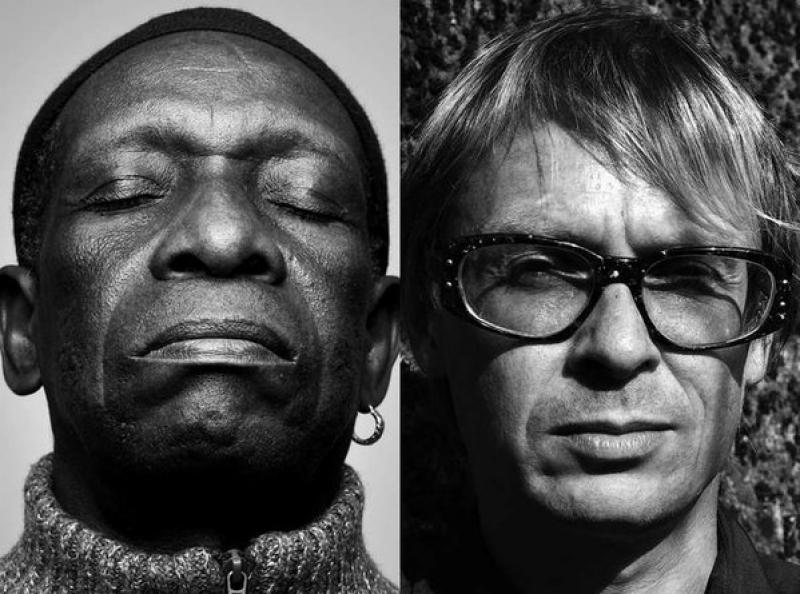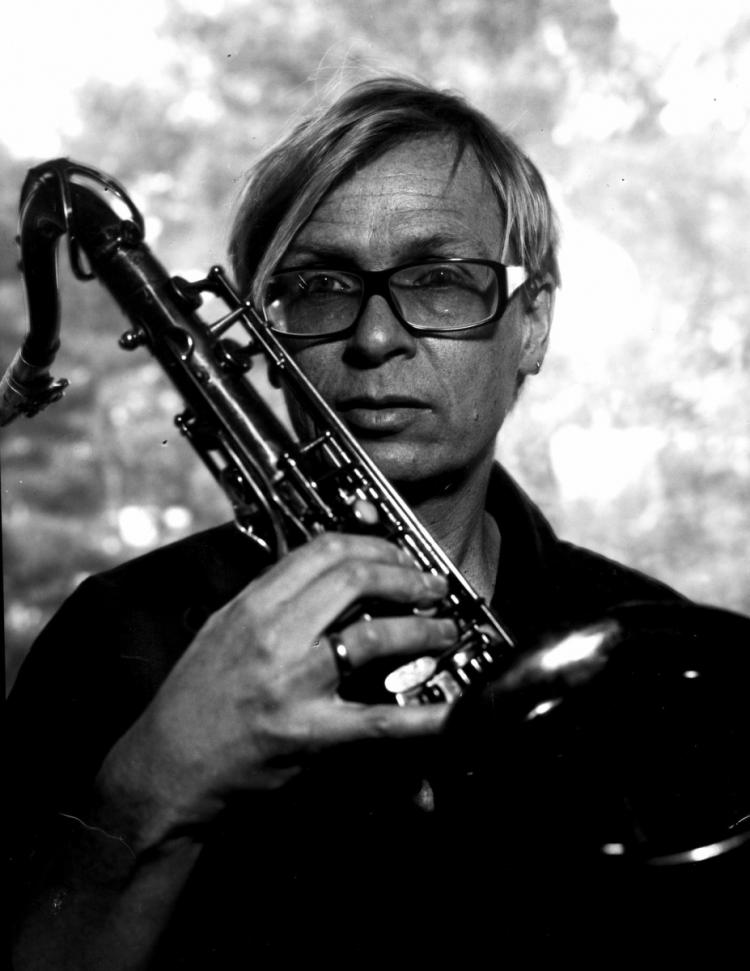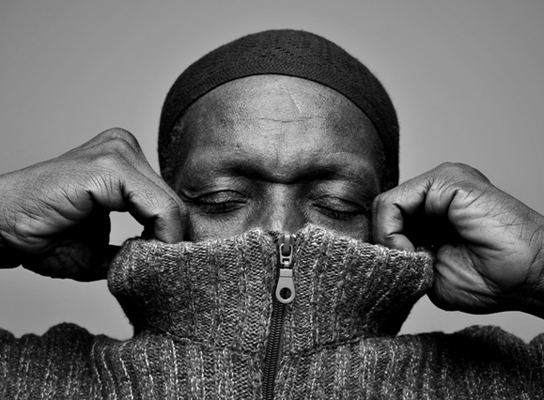Tony Allen and Jimi Tenor, Café OTO | reviews, news & interviews
Tony Allen and Jimi Tenor, Café OTO
Tony Allen and Jimi Tenor, Café OTO
Finnish-Afrobeat-Moog fusion melts the decades together

Questions of what is authentic and what is retro get more complicated the more the information economy matures. Music from decades past that only tens or hundreds of people heard at the time it was made becomes readily available, gets sampled by new musicians, and passes into the current vernacular. Modern musicians play archaic styles day in day out until it becomes so worn into their musculature that it reflects their natural way of being.
And in the thick of all this, musicians keep working and keep doing their thing regardless. Finnish multi-instrumentalist Jimi Tenor (pictured below right) came of musical age in the mid-Nineties making electronic lounge music and signed to WARP records, the label at the hub of all things digital and glitchy. The 75-year-old Tony Allen was the drummer who, as the man at the back of the bands led by Fela Kuti in Lagos, Nigeria, provided the heartbeat of Afrobeat in the Sixties and Seventies. But adopted Parisan Allen has collaborated with untold fusioneers and electronicists over the years, and Tenor has, since 2000, played around the world with Ghanaian band Kabu Kabu as well as making an album with Allen himself (though just as prone to make music with, say, digital tablas as anything else), so their worlds are distinctly blurred.
 The show at avant-garde haven Café OTO was energised from the start by Sheffield's Blood Sport, a trio who – though none of them looked older than about 17 – played with furious precision. They began with tickly analogue synth doodles that made it seem like they might be about psychedelic indulgence, but as their drummer locked into the electronic sequencer and they began to pick up guitars it became clear they were about something altogether more aggro. With heavy hints of The Fall to the repetitions of guitar discord, they created a scouring sound, never wavering from that pulse from the synthetic arpeggios and creating as close an approximation to the experience of a gritty techno basement as I've ever seen from a live rock band.
The show at avant-garde haven Café OTO was energised from the start by Sheffield's Blood Sport, a trio who – though none of them looked older than about 17 – played with furious precision. They began with tickly analogue synth doodles that made it seem like they might be about psychedelic indulgence, but as their drummer locked into the electronic sequencer and they began to pick up guitars it became clear they were about something altogether more aggro. With heavy hints of The Fall to the repetitions of guitar discord, they created a scouring sound, never wavering from that pulse from the synthetic arpeggios and creating as close an approximation to the experience of a gritty techno basement as I've ever seen from a live rock band.
In comparison, Allen and Tenor's set was downright breezy. With Tenor moving from sax to flute to keyboard, and Allen's beats rolling elegantly along, it was easily funky almost to the point of kitsch. However, a couple of very serious elements pushed it beyond. First, they had a silent partner in a young man generating basslines from a wall of synthesisers. These were almost never foregrounded, bar the occasional chirp or twitter as the sound was modulated, but formed the pulse of the entire set. Hinting at early electronic funk – Stevie Wonder's Seventies output with Tonto's Expanding Head Band came to mind – and the very beginnings of house music, this threw Blood Sort's intense connection with the machines into the shade, so easy was the connection between the digital-mechanical and the loose, jazzy playing.
 Second, that playing was effortlessly astounding. Maybe one shouldn't be surprised that Tony Allen (pictured left) – the man who Brian Eno called the greatest drummer in the world – could still be so great, but in the flesh he took our breath away again and again without ever seeming to make the slightest effort. He would drop one beat out into silence, replace the next with a series of cymbal rolls a drummer a third of his age would sweat to achieve, then hit the next with the most tonally perfect snare hit, without ever losing sense of the funk – and this would happen ever single bar in new permutations. Nothing was ever the same, yet the groove was rock solid. Even more astoundingly, this was locked in with nanosecond precision to the sequenced bassline of the wall of Moog synths.
Second, that playing was effortlessly astounding. Maybe one shouldn't be surprised that Tony Allen (pictured left) – the man who Brian Eno called the greatest drummer in the world – could still be so great, but in the flesh he took our breath away again and again without ever seeming to make the slightest effort. He would drop one beat out into silence, replace the next with a series of cymbal rolls a drummer a third of his age would sweat to achieve, then hit the next with the most tonally perfect snare hit, without ever losing sense of the funk – and this would happen ever single bar in new permutations. Nothing was ever the same, yet the groove was rock solid. Even more astoundingly, this was locked in with nanosecond precision to the sequenced bassline of the wall of Moog synths.
The set went this way and that, sometimes dominated by Tenor's vocodered robot voice, sometimes by Allen's own Afrobeat singing backed by a female vocalist just offstage, but mainly by that endless roll of funk. The synthesisers never took over, always providing the pulse underneath it all that – though not exactly futurist in itself – seasoned the obviously recognisable elements upfront with something entirely unique and new. If there was a fault in the set it was with the audience: this was music to dance to, and not enough people did. All questions of modernism and retro should have been subsumed into the eternal now of the dancefloor, and as it was, the room was caught up too much between admiration of spectacle at the front and East London hipster chatter in the back of the room. It's a minor niggle, but a real one, because as these musicians from across continents, decades and technological movements locked so perfectly into an often transcendent groove, it felt that if the crowd had too, the whole place could have lifted off into space.
rating
Explore topics
Share this article
The future of Arts Journalism
You can stop theartsdesk.com closing!
We urgently need financing to survive. Our fundraising drive has thus far raised £33,000 but we need to reach £100,000 or we will be forced to close. Please contribute here: https://gofund.me/c3f6033d
And if you can forward this information to anyone who might assist, we’d be grateful.

Subscribe to theartsdesk.com
Thank you for continuing to read our work on theartsdesk.com. For unlimited access to every article in its entirety, including our archive of more than 15,000 pieces, we're asking for £5 per month or £40 per year. We feel it's a very good deal, and hope you do too.
To take a subscription now simply click here.
And if you're looking for that extra gift for a friend or family member, why not treat them to a theartsdesk.com gift subscription?
more New music
 Album: Inhaler - Open Wide
Dublin indie rock quartet expand and adapt their sound
Album: Inhaler - Open Wide
Dublin indie rock quartet expand and adapt their sound
 Album: Guided By Voices - Universe Room
Unique soundscapes and a dynamic approach with clear standout tracks
Album: Guided By Voices - Universe Room
Unique soundscapes and a dynamic approach with clear standout tracks
 Album: The Weeknd - Hurry Up Tomorrow
The Canadian superstar's latest is mopey and overlong but has its moments
Album: The Weeknd - Hurry Up Tomorrow
The Canadian superstar's latest is mopey and overlong but has its moments
 Formal Sppeedwear, The Windmill review - Stoke-on-Trent trio reinvigorates the new wave era
Daisy fresh idiosyncrasy which isn’t nostalgia
Formal Sppeedwear, The Windmill review - Stoke-on-Trent trio reinvigorates the new wave era
Daisy fresh idiosyncrasy which isn’t nostalgia
 Album: Cymande - Renascence
A brave and mostly brilliant attempt to revive half-century-old magic
Album: Cymande - Renascence
A brave and mostly brilliant attempt to revive half-century-old magic
 Album: Bonnie 'Prince' Billy - The Purple Bird
Will Oldham exudes suitably laidback vibes from deep in the heart of Nashville
Album: Bonnie 'Prince' Billy - The Purple Bird
Will Oldham exudes suitably laidback vibes from deep in the heart of Nashville
 theartsdesk on Vinyl 88: Violent Femmes, Ringo Starr, ARXX, Dexter Gordon, Black Star, Dennis Bovell and more
The wildest, most wide-ranging record reviews in our galaxy
theartsdesk on Vinyl 88: Violent Femmes, Ringo Starr, ARXX, Dexter Gordon, Black Star, Dennis Bovell and more
The wildest, most wide-ranging record reviews in our galaxy
 Album: Gary Kemp - This Destination
The master songwriter can't help but write a catchy tune
Album: Gary Kemp - This Destination
The master songwriter can't help but write a catchy tune
 Music Reissues Weekly: New York Dolls - Showdown At The Mercer
Historically important earliest-known live recording of the punk precursors
Music Reissues Weekly: New York Dolls - Showdown At The Mercer
Historically important earliest-known live recording of the punk precursors
 Album: ALT BLK ERA - Rave Immortal
Nottingham siblings' debut buzzes with amalgamated drum'n'bass and hard rock energy
Album: ALT BLK ERA - Rave Immortal
Nottingham siblings' debut buzzes with amalgamated drum'n'bass and hard rock energy
 Album: Ludovico Einaudi - The Summer Portraits
Long summer holidays remembered
Album: Ludovico Einaudi - The Summer Portraits
Long summer holidays remembered


Add comment